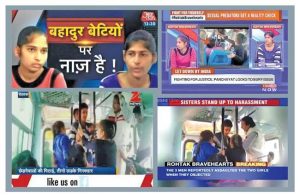A Sonepat court has decreed that a case where two girls were intimidated by three boys in a moving bus in 2014 was not one of sexual harassment. The video which went viral also shows the media in a poor light
~By Vipin Pubby in Chandigarh
Towards the end of November 2014, virtually all national news television channels were showing a video of two Haryana girls beating up a couple of boys for allegedly sexually harassing them. One of the girls even hit them repeatedly with a belt as the boys kept arguing that they had done no wrong.
The anchors were, however, in no mood to relent, hailing the bravery of the two college-going girls and that too in a state where their gender is given a raw deal and where the sex ratio is the worst in the country. Most of the channels rushed teams to interview the “bravehearts” and others invited them over for studio interviews and discussions. As the girls basked in glory and were feted for giving it back to the “harassers”, no one questioned them on the details.
REAL DISPUTE
However, last week, a Sonepat court decreed that there was no merit in the claims made by the girls—Aarti and Pooja—about sexual harassment and that the three boys were innocent. Almost 40 witnesses in the case, a majority of them women passengers, backed the boys and claimed that there was a dispute over seats in the bus but there was no incident of sexual harassment.

Harish Goyal, Additional Chief Judicial Magistrate of Sonepat, observed: “There is no material which can be used to frame charges against the accused….” Discharging the three youth in the case, the magistrate said: “From their (girls’) statements, it is clear that the real dispute arose because of the seat number.”
Pointing out the contradictions in statements recorded before the magistrate, the court stated: “Neither in the complaint, nor in the statements, is it stated as to what type of words were used by the accused. So without actual analysis of the words, it is not prima facie proved that the accused did anything that can be covered under Section 354-A (sexual harassment) of the Indian Penal Code (IPC).” The incident, which led to a huge public outcry over women’s safety, prompted several experts to say that the girls had done the right thing and their “bravery” would serve as a lesson to others.
The Haryana government promptly announced a cash award of Rs 31,000 for the two girls but held it back when a couple of days later, another video emerged showing the same girls beating up another boy in an almost identical manner in a public park. In the meantime, the boys were placed under arrest and charged with sexual harassment of the girls. One of the boys had cleared a written test for recruitment into the Army but was denied permission to attend an interview after the clips of his being beaten were repeatedly aired on television channels.
Their parents and neighbours sought to defend the boys but no one, including the media, was willing to listen to their version. In fact, editors, anchors and reporters overlooked the gaping holes in the story cooked up by the girls. Obviously, it would have been “politically incorrect” to “defend” those accused of sexually harassing any girl.
However, what evidently struck no one was how did the video emerge and who put it out on social media. It was clear as daylight that the plan to record the beating was made much before the beating had started. No media person sought out the families of the boys or even talked to the police. No one made an attempt even later to contact the victim who was beaten up in the public park.
CONTRADICTORY STATEMENTS
It was during cross-examination in the court that it was revealed that the girls had first handed over their mobile phone to a co-passenger, Vijeta, and had asked her to shoot when they started beating the boys. In her testimony in court, the co-passenger said that she had recorded the incident at the behest of one of the girls. She said she could not unlock their phone and had instead recorded the incident on her mobile which she later sent to the girls. She submitted her mobile carrying the original recording to the court.
During the hearing, the court observed contradictions in the statements of the two girls. They had also failed a polygraph test and Psychological Assessment Test, while the three accused, Kuldeep, Mohit and Deepak, had cleared them and had reacted “positively” to tests conducted by the Central Forensic Science Laboratory. Only one of the passengers travelling on the bus supported the version of the girls. All the other passengers told the court that the boys were only trying to convince the girls to vacate a seat that belonged to another woman passenger.
One of the accused, Mohit, said after the court verdict: “Insaf to mila, izzat aur naukri kahan se ayegi? (We have got justice but what about our prestige and jobs?)” Life is obviously not the same for the three boys. Neither has the media expressed regret over its version nor has it run the story about the acquittal of the boys prominently.


